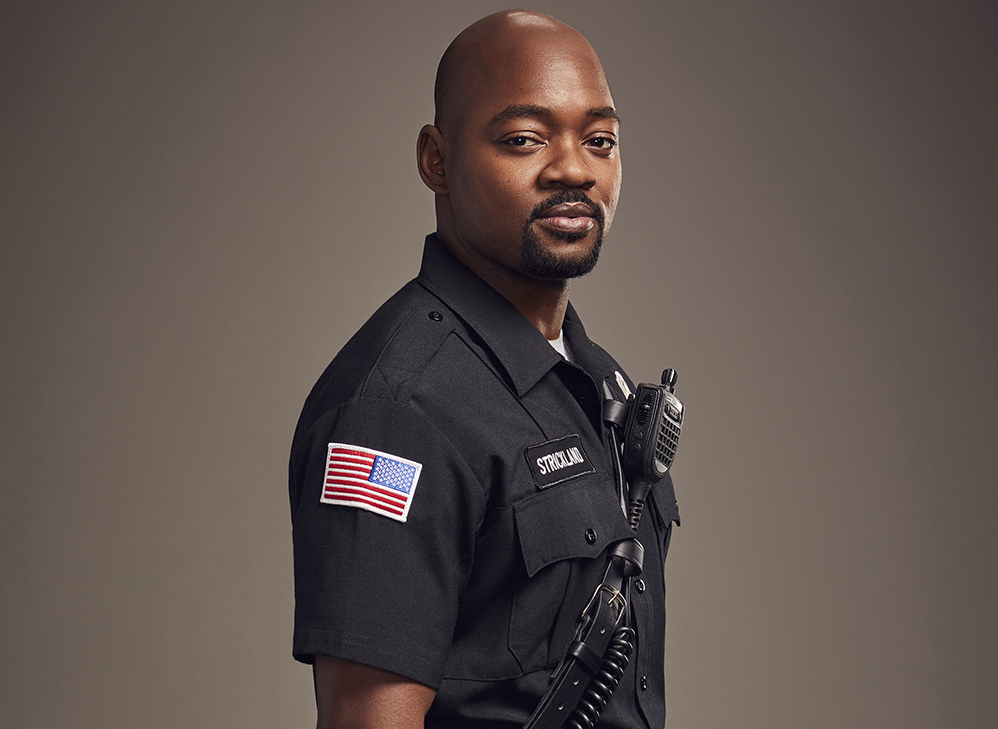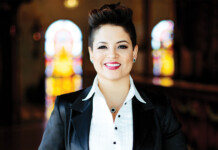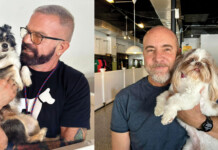Without any positive trans role models, Brian Michael Smith grew up in 1980s Michigan thinking a Black transman couldn’t be an actor. He wasn’t seeing himself on TV, or anywhere. But now and then, things change for the better. Today, people are seeing him everywhere, most notably on Fox’s 9-1-1: Lone Star, a spin-off of the 9-1-1 first-responders show, this time set in Austin, Texas.
It’s a history-making role: Smith, as Paul Strickland, with a Sherlock Holmes-type mind, is the first transman to star as a series regular on network TV. Before joining the procedural drama, Smith played Officer Antoine “Toine” Wilkins, another transman, on OWN’s Queen Sugar, which was executive produced by Oprah Winfrey and Ava DuVernay. His other acting credits include The L Word: Generation Q, HBO’s Girls, NBC’s Chicago P.D. and Showtime’s Homeland. In the 2020 documentary Disclosure, Smith spoke about the historical evolution of trans depiction and representation in media alongside other Hollywood trans influencers and icons, including Laverne Cox and Matrix filmmaker Lilly Wachowski.
Smith is now the change he yearned to see as a kid, when he’d cut through the woods of Ann Arbor with friends to get to school, acting out scenes from movies and cartoons on the way. And hoping that, one day, the rest of the world would accept him as he is.
What kind of kid were you?
I was such an Ann Arbor kid. I would spend so much time outside. I was born in ’83, so Stranger Things is a lot like how I spent my afternoons. I had a core group of four friends. and we would just get together after school and go play in the woods. Go walk in the woods to get to a certain playground, or go to the woods, just to go to another neighborhood; get in some mischief, knock over garbage cans, bike away. I was one of those kids. (Laughs.)
Did you know then that you wanted to be an actor?
Yeah, I loved to perform. My mom and her sisters all had kids around the same time and then they lived together for a while. They liked to get together and tell stories and have us tell stories, so it’d be a lot like, “Come here and do your thing.”
It was fifth grade when I wrote a play, and what was really cool was I got a chance to write this character. I (introduced) my character on stage, with all the attention on me, and nobody challenged that. That was really powerful for me. Because when I was really little, I was telling people, “I’m a boy, I’m a boy,” and you know, having to defend myself when I would say that. So I liked having that transformative power that I could be whoever I wanted to be when I was performing. When I went to school, I was only getting these female roles given to me in class and thought, “I don’t know if I’m going to be able to do this.”
What was your experience growing up in Ann Arbor knowing you identified as a boy?
I didn’t even know much about queerness or queer identity. But I was able to be myself. I played football on the boys team at Pioneer (High School). I scored a touchdown, and I’m technically the only female in the state of Michigan history to ever score a touchdown in football on varsity. I say that distinctly because it was Ann Arbor.
I remember how afraid I was when I was crossing that giant parking lot to go to the football practice field for tryouts that first day and thinking, “They’re gonna say no, I’m going to have to really fight for this.” So I walked right up to the coach and said, “I’m here to play football.” He goes, “OK, the equipment’s over there; go check in with that guy.” And the freshmen are up on the upper field and I’m like, “Oh, shit.” I think that was a uniquely Ann Arbor experience, the lack of resistance.
You’ve blown up in the last few years. Does this feel like a breakthrough moment for you?
Absolutely. It feels incredible because a lot of what I wanted for myself has manifested this year. And it’s been kind of a challenge because this started to blossom the most (last) January and February. I was riding this wave after I got booked (on 9-1-1: Lone Star) in September of 2019. We were filming and so much of what I wanted to experience, things that I sacrificed for the past 11 years, all this hustling and grinding in New York, started to come to fruition. Then the pandemic hit. So it’s been challenging for me because I know how many people are going through what I would have been going through had this pandemic hit my life in 2018.
How did you get involved in Lone Star?
I was talking to a friend of mine at this event and I’m just like, “Oh, man, I’m having a good time and I’m performing but it’s not exactly what I want. I want to be a series regular on an action-oriented show.” I swear to God that as I’m talking to him, he goes, “Say what you want.” And as soon as I stopped talking I got an email from my agent: “Hey, you got an audition for the 9-1-1 spinoff.” Then I read the character breakdown and it’s like, “Trans, roughneck, from Chicago, Midwest.” I was geeked! It checked all the boxes.
When I watched the pilot, I was really blown away that I was watching something as LGBTQ-inclusive as this, a show that feels like something my Midwestern mom and dad would watch, on Fox.
Yes, that’s the thing. That is the thing. It’s an honor, for sure, to be working on The L Word and to bring that kind of authentic representation into a show that didn’t necessarily have the greatest history with transmasculine representation. But it’s a Showtime show. I grew up watching network prestige dramas. I’m a huge fan of these cop dramas and medical dramas, and I’m aware that that’s what people gather around. Those are the fireside chats. These go to the homes in the Midwest. You have to look for Queer Sugar. You have to look for The L Word. But this is on Fox. This is going to reach so many people who may not ever have an opportunity to see anyone like this.
There’s a built-in audience for this kind of show already, and then they see a Black transman playing a Black transman on a network TV show getting to be as heroic as a cis white man gets to be on these kinds of shows. What does that feel like?
It feels right and unreal, at the same time. Unreal given that I came from the Midwest and I never even knew that there were other people like me until I was 20. In the generation that I came up in, everything had to be a secret. So, I was thinking for a long time that I’m not going to be able to do what I want to do: performance, being an actor and being fully myself. Then slowly I came to realize, because of trailblazers that went before me like Laverne Cox, that, “Wait, we can. And maybe I can be a trans actor and maybe I can play a trans character.” And not just a trans character who’s a victim or the butt of a joke, or a villain, or a side character. A whole series regular.” That was only six years ago.
What can other writers and creators learn from the way Lone Star depicts its trans character?
I think they do a great job of listening to trans people. There isn’t a trans writer in the room right now, but they’ve listened to the input that I have. It’s also part of the Ryan Murphy universe, so I think they learned a lot from the Pose experience and how having actual trans voices and listening to other trans consultants and showrunners is what brings the authenticity to a role. Then writing to the humanity of the character and not just what feels sensational about them. The character can just happen to be trans. They can be all these other things, and that is just a part of who they are.
What can you say about Paul’s character arc this season?
We get to know a lot more about Paul in this season that I’m excited about. What’s great is they’ve sort of built in the timeline, so time has passed and because of the quarantine the team is spending even more time together than they would just being firefighters who work 48-hour shifts together. They’ve changed up even how we respond to calls based on what COVID protocols would be.
What about Paul’s personal life and romantic life?
To be honest, what I know about his personal life so far is… I think dates are happening. I haven’t seen anything OK’d yet, but we get to know more about his family life, which is interesting.
Would you like to see Paul with a romantic interest?
Oh yeah, oh yeah. Yeah! Come on! Paul’s been getting in shape! He’s got his quarantine body together! (Laughs.)

When interviewing for the job in the first season, you tell the firefighter captain that being trans means you’ve had to be a step ahead of everyone simply because you’re trans, for survival purposes. Was that true for you in your own life as well?
I think to some degree, yeah. I didn’t know if I knew any trans people growing up. For a long time, I thought I was the only one. And the only real representation I had of an actual trans person was Brandon Teena, and he was murdered. And it was by people he trusted or tried to trust. So, I think in the back of my mind I’ve probably always had that: “How much of this do I need to protect?” So yeah, just reading people, keeping an eye on people. I grew up in a very Southern Baptist traditional household and a very heteronormative space, so when I did start to hear even just the word “gay” it was in the negative connotation that kids use in middle school. On talk shows and in tabloids all I saw were negative depictions of transwomen. I didn’t know an actual transman existed until I was 20. The first was Jamison Green on this website, and I saw this fully functioning adult man, a writer, and he’s all these things I was. Then when I saw that transmen existed; I knew exactly who I was. It was this very beautiful, eye-opening, tears-with-joy moment when I realized that there’s a future for me.
During that same interview, the captain says to you, “Somewhere in this town right now is a kid who’s just like you were. Feeling scared, hopeless. I’d like you to show him, or her, or they it’s OK to be who you are.” That’s true of Paul, but that’s also true of you, Brian. What do you hear from young trans and gender-nonconforming people who watch the show?
It was that line that really hit home for me. That was in the audition material that they sent to me when I wanted to audition. I read that line and felt like that was my life mission as a trans person. Knowing I was different and had all these struggles because I was different, I asked myself this question: Why? Why was I born like this? Just why, why, why?
Then I’m doing this and parents are telling me now that they don’t feel as afraid for their child because they know they can be a happy, functioning person because of the character and me, the person. Children reach out and say, “You’re my hero and I can grow up and be like you.” Forty-year-old adults who have never seen anybody like themselves and now feel the courage to be themselves. Well, that’s why. That’s why I went through all that stuff. That’s why I was born the way I was born.
















